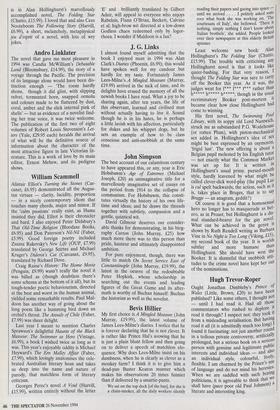William Scammell
Alistair Elliot's Turning the Stones (Car- canet, £6.95) demonstrated all the Augus- tan virtues — clarity, lucidity, proportion — in a nicely contemporary idiom that touches many chords, major and minor. If the 'calm passions' really exist, as Hume insisted they did, Elliot is their chronicler and bard. I also enjoyed Peter Didsbury's That Old-Time Religion (Bloodaxe Books, £6.95) and Don Paterson's Nil-Nil (Faber, £5.99). Good foreign poetry included Zsuzsa Rakovsky's New Life (OUP, £7.99) translated by George Szirtes and Michael Kruger's Diderot's Cat (Carcanet, £9.95), translated by Richard Dove. Craig Raine's History The Home Movie (Penguin, £9.99) wasn't really the novel it was billed as (though doubtless there's some schema at the bottom of it all), but its tough-tender poetic behaviourism, directed at the best and worst in the human animal, yielded some remarkable results. Paul Mul- doon has another way of going about the long poem like a humming bird down an orchid's throat. The Annals of Chile (Faber, £7.99) was sheer delight.
Last year I meant to mention Charles Sprawson's delightful Haunts of the Black Masseur: The Swimmer as Hero (Vintage, £6.99), a book I wished twice as long as it was. This year's enjoyable oddity is Michael Heyward's The Ern Malley Affair (Faber, £7.99), which lovingly anatomises the cele- brated Australian literary hoax and takes us deep into the name and nature of parody, that matchless form of literary criticism.
Georges Perec's novel A Void (Harvill, 115.99), written entirely without the letter
`E' and brilliantly translated by Gilbert Adair, will appeal to everyone who enjoys Rabelais, Flann O'Brian, Beckett, Calvino et al; high-brow wit directed at a low-down Godless chaos redeemed only by logor- rhoea. I wonder if Muldoon is a fan?










































































 Previous page
Previous page